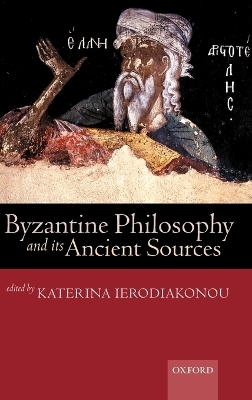
Byzantine Philosophy and its Ancient Sources
Oxford University Press (Verlag)
978-0-19-924613-7 (ISBN)
Byzantine philosophy is an almost unexplored field. Being regarded either as mere scholars or as primarily religious thinkers, Byzantine philosophers, for the most part, have not been studied on their own philosophical merit, and their works have hardly been scrutinized as works of philosophy. Thus, although distinguished scholars in the past have tried to reconstruct the intellectual life of the Byzantine period, there is no question that we still lack even the beginnings of a systematic understanding of the philosophy of the Byzantines.
Byzantine Philosophy and its Ancient Sources is conceived as a concerted attempt in this direction. It examines the attitude the Byzantines took towards the ancient philosophical tradition and the specific ancient sources which they relied upon to form their theories. But did the Byzantines merely copy ancient philosophers or interpret them the way they already had been interpreted in late antiquity? Does Byzantine philosophy as a whole lack a distinctive character which differentiates it from the previous periods in the history of philosophy?
Eleven scholars, representing different disciplines from philosophy and history to classics and medieval studies, approach these questions by thoroughly investigating particular topics which give us some insight as to the directions in which we should look for possible answers. These topics range, in modern terms, from philosophy of language, theory of knowledge, and logic, to political philosophy, ethics, natural philosophy, and metaphysics. The philosophers whose works our contributors study belong to all periods from the beginnings of Byzantine culture in the fourth century to the demise of the Byzantine Empire in the fifteenth century.
Katerina Ierodiakonou is Assistant Professor of Ancient Philosophy at the National Technical University of Athens, and Tutorial Fellow in Philosophy at St Hugh's College, University of Oxford.
Introduction ; 1. Greek-Latin Philosophical Interaction ; 2. Basil of Caesarea on the Semantics of Proper Names ; 3. The Justinianic Dialogue On Political Science and its Neoplatonic Sources ; 4. John of Damascus on Human Action, the Will, and Human Freedom ; 5. Syllogistic in the Anonymous Heiberg ; 6. Helenic Philosophy in Byzantium and the Lonely Mission of Michael Psellos ; 7. Psellis' Paraphrasis on Aristotle's De Interpretatione ; 8. 'To Every Argument There is a Counter-Argument'. Theodore Metochites' Defence of Scepticism (Semeiosis 61) ; 9. The Anti-Logical Movement in the 14th Century ; 10. Byzantine Commentators on the Chaldaean Oracles: Psellos and Plethon ; 11. Plethon and Scholarios on Aristotle ; Epilogue: Current Research in Byzantine Philosophy ; Index Locorum, Index of Names
| Erscheint lt. Verlag | 1.5.2002 |
|---|---|
| Verlagsort | Oxford |
| Sprache | englisch |
| Maße | 122 x 241 mm |
| Gewicht | 567 g |
| Themenwelt | Geisteswissenschaften ► Philosophie ► Philosophie Altertum / Antike |
| Geisteswissenschaften ► Philosophie ► Philosophie des Mittelalters | |
| Religion / Theologie ► Christentum ► Kirchengeschichte | |
| Sozialwissenschaften | |
| ISBN-10 | 0-19-924613-0 / 0199246130 |
| ISBN-13 | 978-0-19-924613-7 / 9780199246137 |
| Zustand | Neuware |
| Haben Sie eine Frage zum Produkt? |
aus dem Bereich


